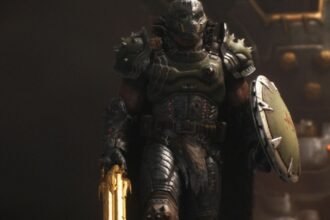In the gripping film “Warfare,” creators Alex Garland and Ray Mendoza bring the intense 2006 Battle of Ramadi to the screen, told through the eyes of a Navy SEAL unit under siege. At first glance, this might seem like a typical war movie, but its stark lack of musical embellishment and clear narrative arcs defies expectations. There’s no clear hero, villain, or moral lesson, and viewers receive little context about the unit’s mission or the soldiers’ backgrounds. Garland and Mendoza take an almost documentary-like approach, embedding viewers within the monotonous routines and sudden chaos faced by these largely anonymous soldiers.
The film takes a stark turn when chaos erupts, highlighted by a dramatic shift in sound design and the start of agonized screams, reinforcing how detached Garland and Mendoza are from conventional war narratives. This minimalist and intense portrayal is rooted in Mendoza’s own harrowing experiences in Ramadi as a Navy SEAL. His journey from combat veteran to film producer, consultant, and stuntman is interwoven with Garland’s cinematic vision. The two bonded over these experiences while working together on Garland’s 2024 movie “Civil War” and later collaborated on “Warfare.”
Mendoza debuts as a director alongside the Oscar-nominated Garland, known for his works like “Annihilation,” “Ex Machina,” and “Devs,” among others. Garnering inspiration from both Mendoza’s real-life experiences and Garland’s narrative expertise, “Warfare” blurs the line between documentary and narrative cinema. The film serves as a collective memory, especially for Ray, portrayed by “Reservation Dogs” star D’Pharaoh Woon-A-Tai, intending to help a fellow soldier, character Elliott Miller (played by Cosmo Jarvis), process past traumas.
For viewers, “Warfare” offers a visceral dive into authentic combat experiences, challenging the romanticized view of war often seen in movies. In an interview, Garland and Mendoza discuss their intentions to fight against the glorified “fantasy of war” typically represented in cinema. They delve into their philosophical beginnings, motivations, and experiences that shaped the making of the film.
Alex Garland, in particular, voices a desire to offer a more honest portrayal of military service as opposed to the distorted narratives people often base their decisions to enlist upon. He and Mendoza stress the importance of conveying military experiences authentically, even when the narrative lacks clear context or conventional cinematic elements like music or time compression.
Despite its primary focus on a particular character’s experience, the film reaches a broader audience by portraying combat’s raw and unfiltered reality. It’s a piece designed not necessarily to instruct or philosophize but to share Mendoza’s real-life experience and highlight the genuine challenges of combat, a theme less often tackled with such naked honesty on the big screen.
The collaborative effort ensures an audio landscape true to real experiences, ditching typical cinema tropes in favor of precise, forensic sound design that mirrors the real-life narratives shared by soldiers. What might appear as artistic choices are, in fact, deliberate recreations of subjective states as recounted by those who lived through them. This desire to capture true memory over conventional storytelling distinguishes “Warfare” as an honest account of war, unconstrained by preconceived dramatic filters.
“Warfare” is now showing in theaters, inviting audiences into the minds and memories of soldiers for an unparalleled cinematic experience.









